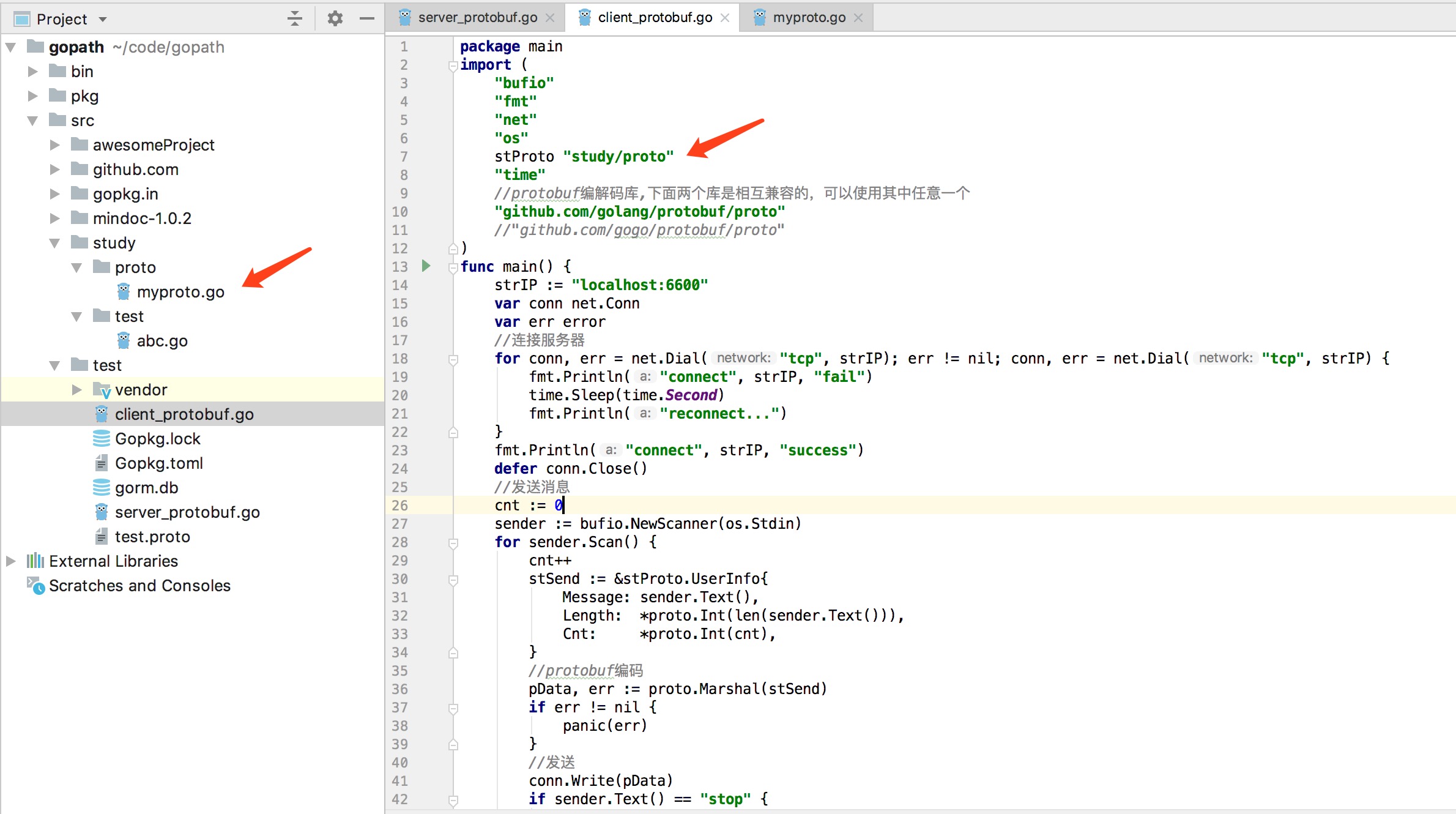golang使用protobuf
约 1268 字 预计阅读 3 分钟
文章目录
为什么要使用protobuf
最近的项目中,一直使用Json做数据传输。Json用起来的确很方便。但相对于protobuf数据量更大些。做一个移动端应用,为用户省点流量还是很有必要的。正好也可以学习一下protobuf的使用
跟Json相比protobuf性能更高,更加规范
- 编解码速度快,数据体积小
- 使用统一的规范,不用再担心大小写不同导致解析失败等蛋疼的问题了
但也失去了一些便利性
- 改动协议字段,需要重新生成文件。
- 数据没有可读性
安装
在go中使用protobuf,有两个可选用的包goprotobuf(go官方出品)和gogoprotobuf。
gogoprotobuf完全兼容google protobuf,它生成的代码质量和编解码性能均比goprotobuf高一些
安装protoc
首先去https://github.com/google/pro… 上下载protobuf的编译器protoc,windows上可以直接下到exe文件(linux则需要编译),最后将下载好的可执行文件拷贝到$GOPATH的bin目录下($GOPATH/bin目录最好添加到系统环境变量里)
安装protobuf库文件
go get github.com/golang/protobuf/proto
goprotobuf
安装插件
go get github.com/golang/protobuf/protoc-gen-go
生成go文件
protoc —go_out=. *.proto
gogoprotobuf
安装插件
gogoprotobuf有两个插件可以使用
- protoc-gen-gogo:和protoc-gen-go生成的文件差不多,性能也几乎一样(稍微快一点点)
- protoc-gen-gofast:生成的文件更复杂,性能也更高(快5-7倍)
//gogogo get github.com/gogo/protobuf/protoc-gen-gogo//gofastgo get github.com/gogo/protobuf/protoc-gen-gofast
安装gogoprotobuf库文件
go get github.com/gogo/protobuf/protogo get github.com/gogo/protobuf/gogoproto //这个不装也没关系
生成go文件
//gogoprotoc --gogo_out=. *.proto#要是没有找到protoc-gen-go,则要指定它: protoc --go_out=./ --plugin=/Users/easub/code/gopath/bin/protoc-gen-go test.proto//gofastprotoc --gofast_out=. *.proto
性能测试
这里只是简单的用go test测试了一下
//goprotobuf"编码":447ns/op"解码":422ns/op//gogoprotobuf-go"编码":433ns/op"解码":427ns/op//gogoprotobuf-fast"编码":112ns/op"解码":112ns/op
go_protobuf的简单使用
test.proto
syntax = "proto3"; //指定版本,必须要写(proto3、proto2)package proto;enum FOO{X = 0;};//message是固定的。UserInfo是类名,可以随意指定,符合规范即可message UserInfo{string message = 1; //消息int32 length = 2; //消息大小int32 cnt = 3; //消息计数}
client_protobuf.go
package mainimport ("bufio""fmt""net""os"stProto "proto""time"//protobuf编解码库,下面两个库是相互兼容的,可以使用其中任意一个"github.com/golang/protobuf/proto"//"github.com/gogo/protobuf/proto")func main() {strIP := "localhost:6600"var conn net.Connvar err error//连接服务器for conn, err = net.Dial("tcp", strIP); err != nil; conn, err = net.Dial("tcp", strIP) {fmt.Println("connect", strIP, "fail")time.Sleep(time.Second)fmt.Println("reconnect...")}fmt.Println("connect", strIP, "success")defer conn.Close()//发送消息cnt := 0sender := bufio.NewScanner(os.Stdin)for sender.Scan() {cnt++stSend := &stProto.UserInfo{Message: sender.Text(),Length: *proto.Int(len(sender.Text())),Cnt: *proto.Int(cnt),}//protobuf编码pData, err := proto.Marshal(stSend)if err != nil {panic(err)}//发送conn.Write(pData)if sender.Text() == "stop" {returnpackage mainimport ("bufio""fmt""net""os"stProto "study/proto""time"//protobuf编解码库,下面两个库是相互兼容的,可以使用其中任意一个"github.com/golang/protobuf/proto"//"github.com/gogo/protobuf/proto")func main() {strIP := "localhost:6600"var conn net.Connvar err error//连接服务器for conn, err = net.Dial("tcp", strIP); err != nil; conn, err = net.Dial("tcp", strIP) {fmt.Println("connect", strIP, "fail")time.Sleep(time.Second)fmt.Println("reconnect...")}fmt.Println("connect", strIP, "success")defer conn.Close()//发送消息cnt := 0sender := bufio.NewScanner(os.Stdin)for sender.Scan() {cnt++stSend := &stProto.UserInfo{Message: sender.Text(),Length: *proto.Int(len(sender.Text())),Cnt: *proto.Int(cnt),}//protobuf编码pData, err := proto.Marshal(stSend)if err != nil {panic(err)}//发送conn.Write(pData)if sender.Text() == "stop" {return}}}
server_protobuf.go
package mainimport ("fmt""net""os"stProto "study/proto"//protobuf编解码库,下面两个库是相互兼容的,可以使用其中任意一个"github.com/golang/protobuf/proto"//"github.com/gogo/protobuf/proto")func main() {//监听listener, err := net.Listen("tcp", "localhost:6600")if err != nil {panic(err)}for {conn, err := listener.Accept()if err != nil {panic(err)}fmt.Println("new connect", conn.RemoteAddr())go readMessage(conn)}}//接收消息func readMessage(conn net.Conn) {defer conn.Close()buf := make([]byte, 4096, 4096)for {//读消息cnt, err := conn.Read(buf)if err != nil {panic(err)}stReceive := &stProto.UserInfo{}pData := buf[:cnt]//protobuf解码err = proto.Unmarshal(pData, stReceive)if err != nil {panic(err)}fmt.Println("receive", conn.RemoteAddr(), stReceive)if stReceive.Message == "stop" {os.Exit(1)}}}
生成后的myproto.go文件如下,包名还可以改,哈哈。:
// Code generated by protoc-gen-go. DO NOT EDIT.// source: test.protopackage proto //包名是可以改的import (fmt "fmt"proto "github.com/golang/protobuf/proto"math "math")// Reference imports to suppress errors if they are not otherwise used.var _ = proto.Marshalvar _ = fmt.Errorfvar _ = math.Inf// This is a compile-time assertion to ensure that this generated file// is compatible with the proto package it is being compiled against.// A compilation error at this line likely means your copy of the// proto package needs to be updated.const _ = proto.ProtoPackageIsVersion3 // please upgrade the proto packagetype FOO int32const (FOO_X FOO = 0)var FOO_name = map[int32]string{0: "X",}var FOO_value = map[string]int32{"X": 0,}func (x FOO) String() string {return proto.EnumName(FOO_name, int32(x))}func (FOO) EnumDescriptor() ([]byte, []int) {return fileDescriptor_c161fcfdc0c3ff1e, []int{0}}//message是固定的。UserInfo是类名,可以随意指定,符合规范即可type UserInfo struct {Message string `protobuf:"bytes,1,opt,name=message,proto3" json:"message,omitempty"`Length int32 `protobuf:"varint,2,opt,name=length,proto3" json:"length,omitempty"`Cnt int32 `protobuf:"varint,3,opt,name=cnt,proto3" json:"cnt,omitempty"`XXX_NoUnkeyedLiteral struct{} `json:"-"`XXX_unrecognized []byte `json:"-"`XXX_sizecache int32 `json:"-"`}func (m *UserInfo) Reset() { *m = UserInfo{} }func (m *UserInfo) String() string { return proto.CompactTextString(m) }func (*UserInfo) ProtoMessage() {}func (*UserInfo) Descriptor() ([]byte, []int) {return fileDescriptor_c161fcfdc0c3ff1e, []int{0}}func (m *UserInfo) XXX_Unmarshal(b []byte) error {return xxx_messageInfo_UserInfo.Unmarshal(m, b)}func (m *UserInfo) XXX_Marshal(b []byte, deterministic bool) ([]byte, error) {return xxx_messageInfo_UserInfo.Marshal(b, m, deterministic)}func (m *UserInfo) XXX_Merge(src proto.Message) {xxx_messageInfo_UserInfo.Merge(m, src)}func (m *UserInfo) XXX_Size() int {return xxx_messageInfo_UserInfo.Size(m)}func (m *UserInfo) XXX_DiscardUnknown() {xxx_messageInfo_UserInfo.DiscardUnknown(m)}var xxx_messageInfo_UserInfo proto.InternalMessageInfofunc (m *UserInfo) GetMessage() string {if m != nil {return m.Message}return ""}func (m *UserInfo) GetLength() int32 {if m != nil {return m.Length}return 0}func (m *UserInfo) GetCnt() int32 {if m != nil {return m.Cnt}return 0}func init() {proto.RegisterEnum("proto.FOO", FOO_name, FOO_value)proto.RegisterType((*UserInfo)(nil), "proto.UserInfo")}func init() { proto.RegisterFile("test.proto", fileDescriptor_c161fcfdc0c3ff1e) }var fileDescriptor_c161fcfdc0c3ff1e = []byte{// 122 bytes of a gzipped FileDescriptorProto0x1f, 0x8b, 0x08, 0x00, 0x00, 0x00, 0x00, 0x00, 0x02, 0xff, 0xe2, 0xe2, 0x2a, 0x49, 0x2d, 0x2e,0xd1, 0x2b, 0x28, 0xca, 0x2f, 0xc9, 0x17, 0x62, 0x05, 0x53, 0x4a, 0x7e, 0x5c, 0x1c, 0xa1, 0xc5,0xa9, 0x45, 0x9e, 0x79, 0x69, 0xf9, 0x42, 0x12, 0x5c, 0xec, 0xb9, 0xa9, 0xc5, 0xc5, 0x89, 0xe9,0xa9, 0x12, 0x8c, 0x0a, 0x8c, 0x1a, 0x9c, 0x41, 0x30, 0xae, 0x90, 0x18, 0x17, 0x5b, 0x4e, 0x6a,0x5e, 0x7a, 0x49, 0x86, 0x04, 0x93, 0x02, 0xa3, 0x06, 0x6b, 0x10, 0x94, 0x27, 0x24, 0xc0, 0xc5,0x9c, 0x9c, 0x57, 0x22, 0xc1, 0x0c, 0x16, 0x04, 0x31, 0xb5, 0x78, 0xb8, 0x98, 0xdd, 0xfc, 0xfd,0x85, 0x58, 0xb9, 0x18, 0x23, 0x04, 0x18, 0x92, 0xd8, 0xc0, 0x96, 0x18, 0x03, 0x02, 0x00, 0x00,0xff, 0xff, 0x27, 0x2c, 0x8f, 0x3c, 0x79, 0x00, 0x00, 0x00,}
测试下:
go run go run server_protobuf.gogo run client_protobuf.go
然后在client终端输入你想输入的文字,然后看下服务端,你会发现,服务端收到了.哈.
我的文件结构如下:
来源文章作者 虞双齐
https://yushuangqi.com/blog/2017/golangshi-yong-protobuf.html#%E7%94%9F%E6%88%90go%E6%96%87%E4%BB%B6

